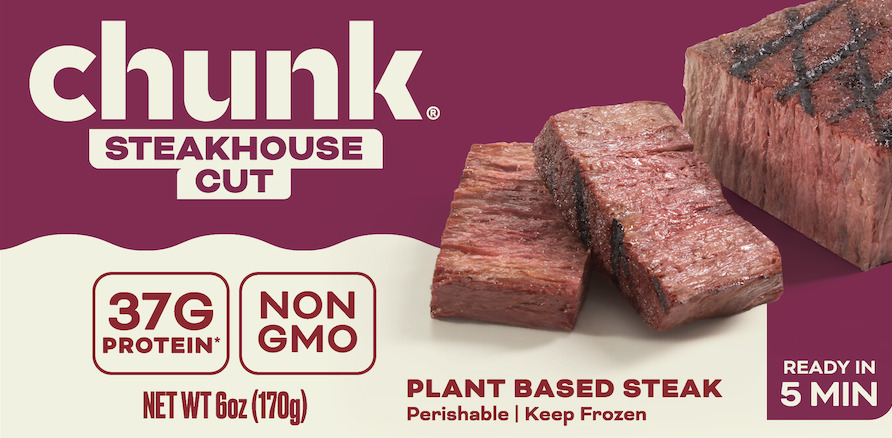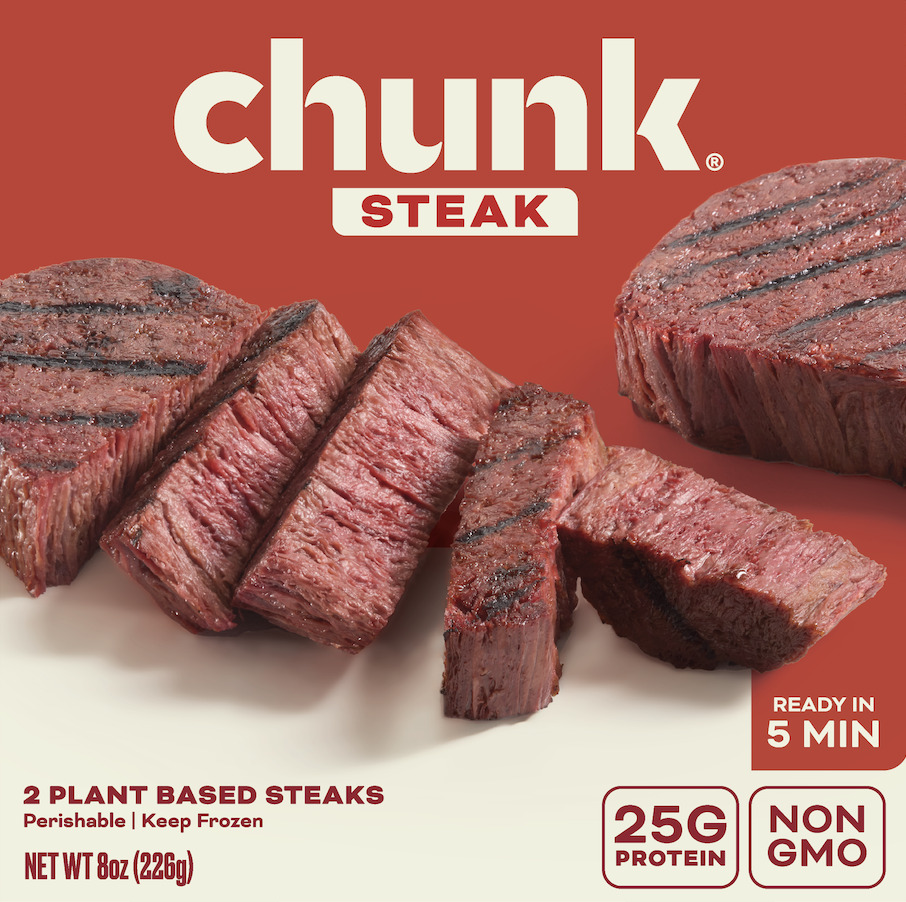Israeli startup Chunk Foods is moving into the retail market in the US via independent retailers in Los Angeles and New York City and eyeing an e-commerce launch before the end of the year to bring its plant-based whole cuts to consumers nationwide.
The startup, which entered the US foodservice market in 2023, is launching in retail with 4oz frozen steaks with 25g protein per serving, a 6oz ‘steakhouse’ cut with 37g protein, 10oz slabs with 31g protein, and pulled meat with 25g protein for stir-fries, sandwiches, or as a topper for salads.
“We have big expansion plans for 2025, bringing these exciting products to more consumers nationwide with larger retailers,” says the firm.
‘Retailers are looking for products that stand out, not just another plant-based option’
Despite lackluster sales in the plant-based category at US retail, founder and CEO Amos Golan told AgFunderNews, “We’ve found that US retailers are still quite open to new players, especially when you’re offering something truly innovative that checks many of the boxes consumers are looking for.
“Retailers are looking for products that stand out, not just another plant-based option. Our focus on whole cuts, great taste, and the texture of real meat has been a key differentiator, and the reception has been positive. Additionally, our focus on convenience and nutrition resonates with retailers.”
As for labeling, he said, Chunk Foods’ short, simple, ingredients list is also resonating: cultured soy protein (defatted soy flour, soy protein isolate, wheat gluten), coconut oil, natural flavors, beet juice concentrate, color, iron, salt, and vitamin B12.
It’s early days, said Amos, who has been ramping up production at the firm’s factory just outside of Tel Aviv, but “building a dedicated facility stateside is definitely something we’re actively exploring. We’ll have more to share on this next year.”

Foodservice: ‘Our churn is nearly zero’
In the US foodservice market, he said, Chunk Foods’ products are now “available nationwide thanks to distribution partners like Chefs’ Warehouse, Sysco, the Webstaurant Store and more. You can also find our whole cuts on menus all around the country at restaurants that range from steakhouses to omakase, to golf clubs and five-star hotels.
“Our churn is nearly zero. We’re seeing strong repeat rates, particularly among customers with unique offerings and experiences.”
The partnership with Mexican meat and dairy business Sigma Alimentos, which invested in Chunk Foods in January, has also been successful, he claimed. “In partnership with Better Balance, we’ve launched at various restaurants in Monterrey and Mexico City, including Mar Del Zur and the Four Seasons Mexico City. Most recently, a co-branded Chunk and Better Balance product has been rolled out to seven Mr. Tofu retail locations around Mexico.”
Chunk Foods products have also performed well at restaurants in Madrid, Spain, he added. “We’ve been testing our products in a few local markets at select restaurant partners, and the feedback has been promising. We’re still in the trial phase, so it’s a bit early to share the full results. We’re optimistic about how things are shaping up and look forward to expanding our collaboration with Better Balance [a subsidiary of Sigma Alimentos making plant-based meats] in Mexico and Spain.”

Solid state fermentation: ‘The unique thing is our ability to control the micro-texture’
Chunk Foods is one of several players making ‘whole cut’ meat alternatives, from Switzerland-based Planted to Slovenia-based Juicy Marbles; Indonesia-based Green Rebel Foods; Germany-based Project Eaden; US-based MyForest Foods, Meati Foods, and Mooii Meats; France-based Swap (formerly Umiami); and Spain’s Novameat.
To make its whole cuts, Chunk Foods ferments soy flour with food-grade microorganisms in a proprietary solid state fermentation process.
This is cheaper than using high-moisture extrusion or submerged fermentation (which requires expensive steel fermentation vessels and downstream processing technology), and is highly tunable, claimed Golan, who has raised around $24.5 million from backers including Cheyenne Ventures and Fall Line Capital since founding Chunk Foods in 2020.
“The unique thing is our ability to control the micro-texture within the whole cut, to the point where we can control the direction of the fibers, the thickness of the fibers, the thickness of the cut, the size of the cut, the color, almost any lever you can pull to change the character of the final product.
“We don’t use any binders or gums, but the product is still super juicy, and holds water and fat very well until they are released in your mouth, so you get a juicy, mouthwatering experience. It’s completely different to tempeh.”
Flavor: More meaty notes, fewer ‘beany, grassy notes’
Beyond texture, however, the fermentation process also contributes significantly to the flavor of the product, he said: “The product has more meaty notes and less beany grassy notes you can get with plant proteins.”
As for regulatory questions, he said, “One of the unique things about the product and the process that’s by design, is that we’re using ingredients and cultures that have been consumed for many years in all the relevant territories. So we’re GRAS [Generally Recognized as Safe] in the US and non-novel [not subject to the Novel Foods Regulation] in Europe.”
‘We’re offering a potentially much more appealing cost structure’
Golan is keeping the details of the production process under wraps but stressed that the factory “doesn’t look anything like” a submerged fermentation facility: “Submerged fermentation is incredibly expensive in terms of capex, while extrusion is almost a commodity technology these days.”
He added: “We’re offering a potentially much more appealing cost structure, and we’ve got a valuable product with a unique sensory experience that’s closer to meat than all the products that I’ve tasted in the space by far.”
Further reading:
Swiss startup Planted rolls out ‘first of its kind’ fermented plant-based steak





